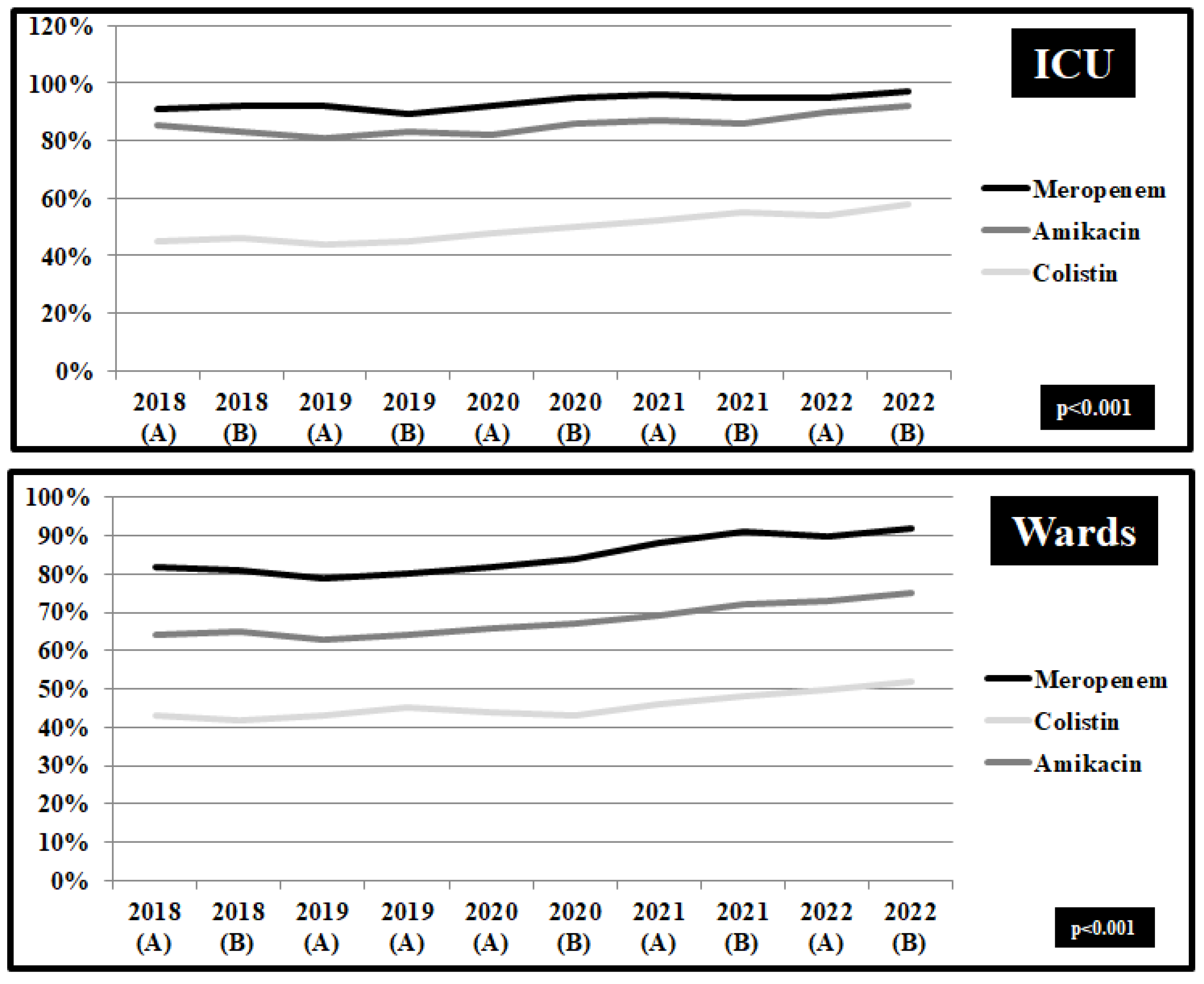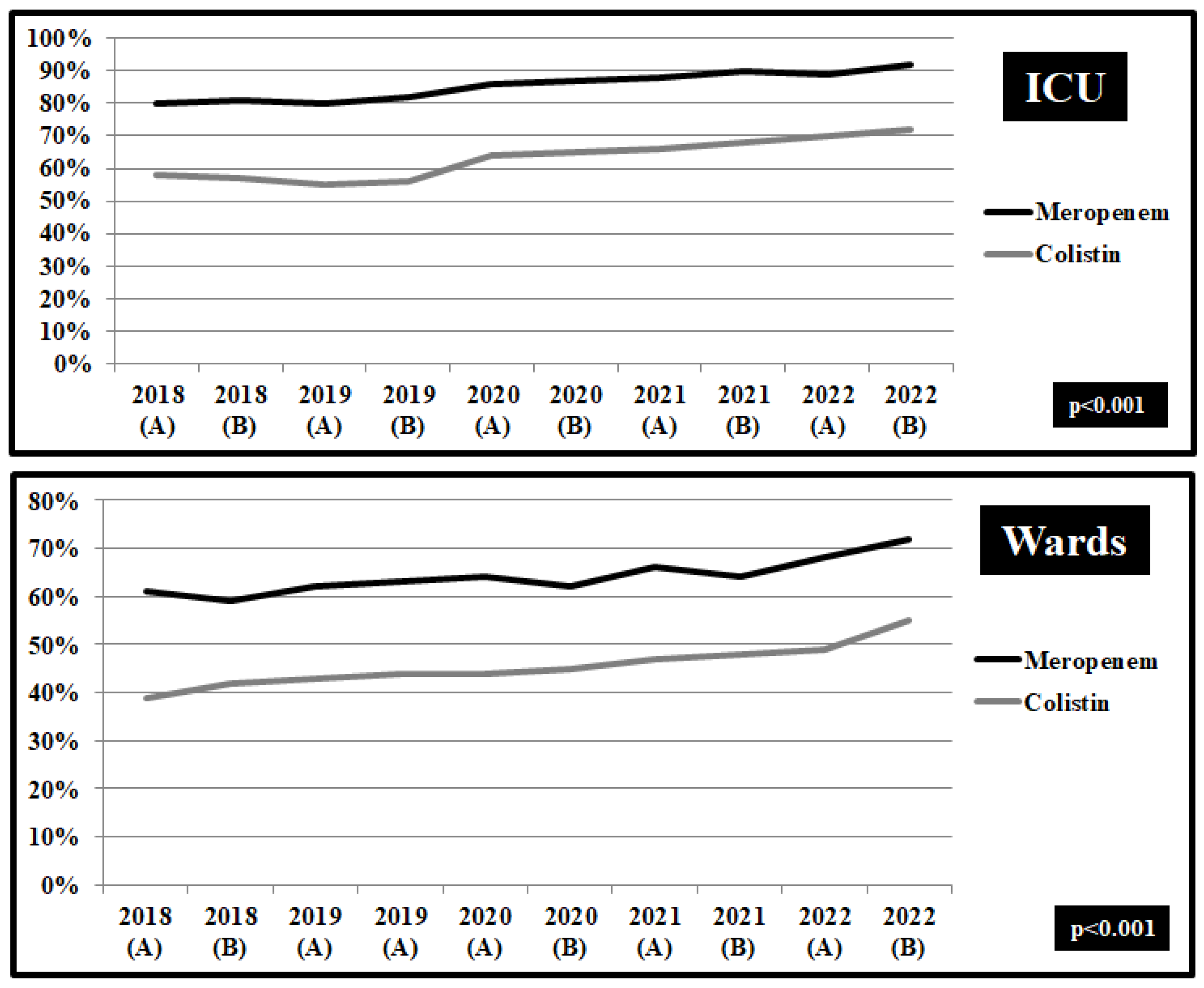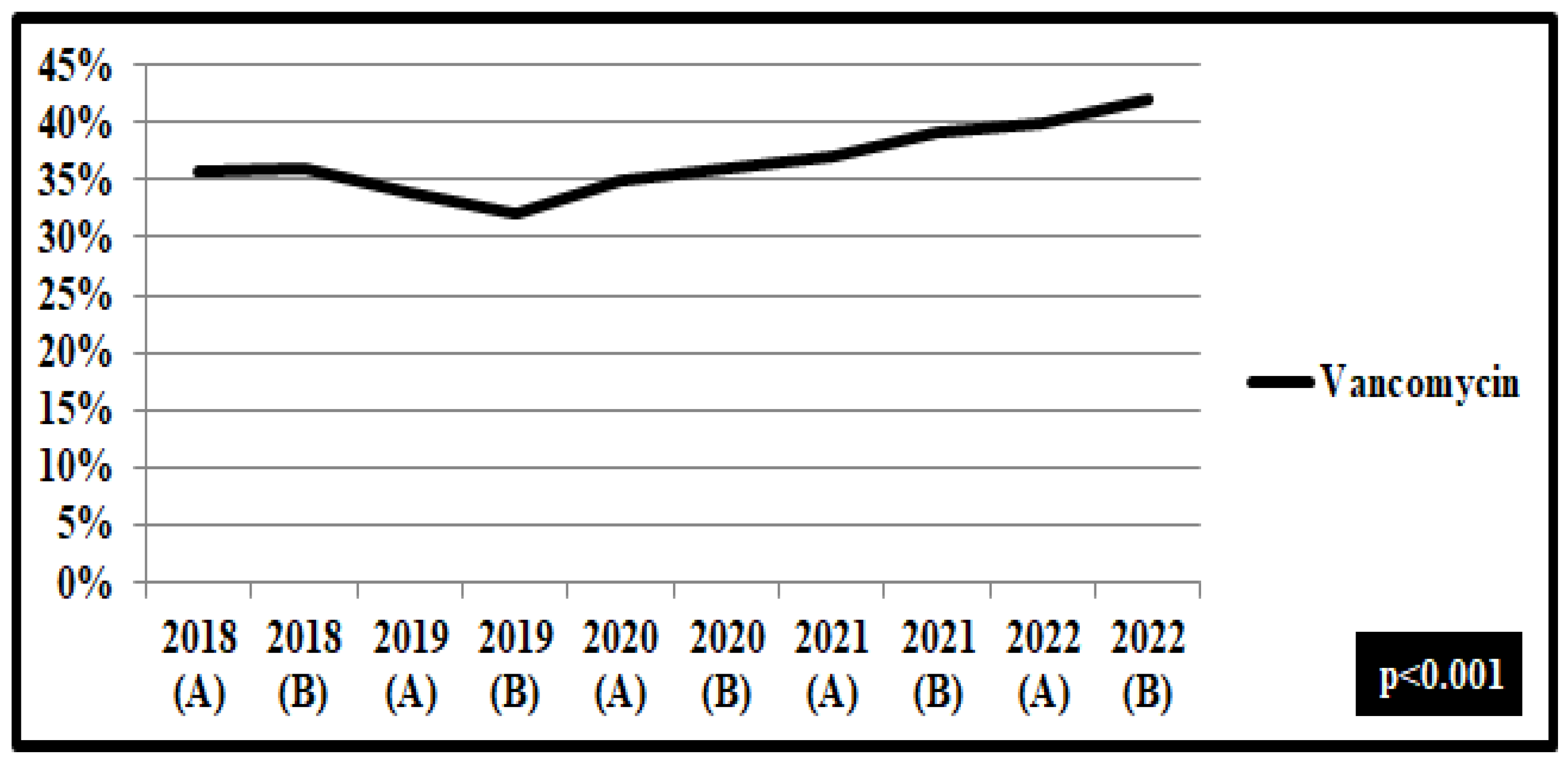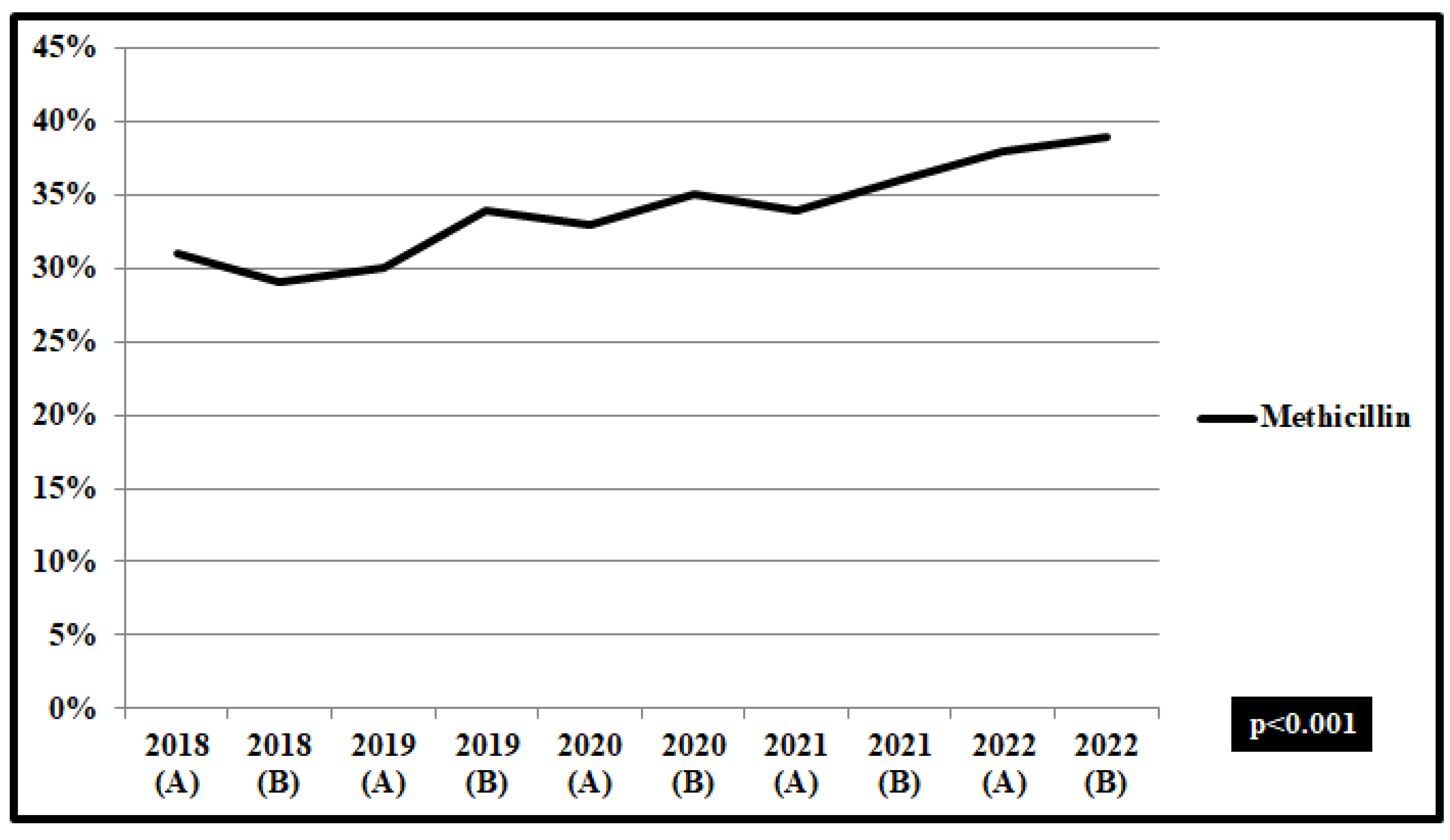Submitted:
28 April 2023
Posted:
29 April 2023
You are already at the latest version
Abstract
Keywords:
1. Introduction
2. Materials and Methods
3. Results
4. Discussion
5. Conclusions
Author Contributions
Funding
Institutional Review Board Statement
Informed Consent Statement
Data Availability Statement
Conflicts of Interest
References
- Polemis, M.; Mandilara, G.; Pappa, O.; Argyropoulou, A.; Perivolioti, E.; Koudoumnakis, N.; Pournaras, S.; Vasilakopoulou, A.; Vourli, S.; Katsifa, H.; et al. COVID-19 and Antimicrobial Resistance: Data from the Greek Electronic System for the Surveillance of Antimicrobial Resistance-WHONET-Greece (January 2018-March 2021). Life (Basel). 2021, 11, 996. [Google Scholar] [CrossRef] [PubMed]
- O’Neill, J. Review on Antimicrobial Resistance: Tackling Drug-Resistant Infections Globally: Final Report and Recommendations. Wellcome Trust; London, UK: 2016. 20p. Available online: https://amr-review.org/sites/default/files/160518_Final%20paper_with%20cover.pdf. (accessed on 18 August 2021).
- WHO Global Action Plan on Antimicrobial Resistance. https://www.who.int/publications/i/item/9789241509763.
- Cassini, A.; Högberg, L.D.; Plachouras, D.; Quattrocchi, A.; Hoxha, A.; Simonsen, G.S.; Colomb-Cotinat, M.; Kretzschmar, M.E.; Devleesschauwer, B.; Cecchini, M.; Ouakrim, D.A.; Oliveira, T.C.; Struelens, M.J.; Suetens, C.; Monnet, D.L.; Burden of AMR Collaborative Group. Attributable deaths and disability-adjusted life-years caused by infections with antibiotic-resistant bacteria in the EU and the European Economic Area in 2015: a population-level modelling analysis. Lancet Infect Dis. 2019, 19, 56–66. [Google Scholar] [CrossRef] [PubMed]
- Lai, C.C.; Chen, S.Y.; Ko, W.C.; Hsueh, P.R. Increased antimicrobial resistance during the COVID-19 pandemic. Int J Antimicrob Agents. 2021, 57, 106324. [Google Scholar] [CrossRef] [PubMed]
- Tiri, B.; Sensi, E.; Marsiliani, V.; Cantarini, M.; Priante, G.; Vernelli, C.; et al. Antimicrobial stewardship program, COVID-19, and infection control: spread of carbapenem-resistant Klebsiella pneumoniae colonization in ICU COVID-19 patients. What did not work? J Clin Med. 2020, 9, E2744. [Google Scholar] [CrossRef] [PubMed]
- Knight, G.M.; Glover, R.E.; McQuaid, C.F.; Olaru, I.D.; Gallandat, K.; Leclerc, Q.J.; Fuller, N.M.; Willcocks, S.J.; Hasan, R.; van Kleef, E.; Chandler, C.I. Antimicrobial resistance and COVID-19: Intersections and implications. Elife 2021, 10. [Google Scholar] [CrossRef] [PubMed]
- Rodríguez-Baño, J.; Rossolini, G.M.; Schultsz, C.; Tacconelli, E.; Murthy, S.; Ohmagari, N.; Holmes, A.; Bachmann, T.; Goossens, H.; Canton, R.; Roberts, A.P.; Henriques-Normark, B.; Clancy, C.J.; Huttner, B.; Fagerstedt, P.; Lahiri, S.; Kaushic, C.; Hoffman, S.J.; Warren, M.; Zoubiane, G.; Essack, S.; Laxminarayan, R.; Plant, L. Key considerations on the potential impacts of the COVID-19 pandemic on antimicrobial resistance research and surveillance. Trans R Soc Trop Med Hyg. 2021, 115, 1122–1129. [Google Scholar] [CrossRef]
- CLS Clinical and Laboratory Standards Institute. Available online: https://clsi.org/standards/products/microbiology/. (accessed on 24 April 2023).
- EUCAST European Committee on Antimicrobial Susceptibility Testing. [(accessed on 24 Aoril 2023)]. Available online: https://www.eucast.org/.
- Patel, J.; Sridhar, D. The pandemic legacy of antimicrobial resistance in the USA. Lancet Microbe. 2022, 3, e726–e727. [Google Scholar] [CrossRef]
- Food and Agriculture Organization of the United Nations. World Organisation for Animal Health. WHO Global Database for the Tripartite Antimicrobial Resistance (AMR) Country Self-assessment Survey (TrACSS) https://amrcountryprogress.org/#/response-overview.
- Centers for Disease Control and Prevention. US Department of Health and Human Services, CDC; Atlanta, GA: 2022. COVID-19: US impact on antimicrobial resistance, special report 2022.
- Liew, Y.; Lee, W.H.L.; Tan, L.; Kwa, A.L.H.; Thien, S.Y.; Cherng, B.P.Z.; Chung, S.J. Antimicrobial stewardship programme: A vital resource for hospitals during the global outbreak of coronavirus disease 2019 (COVID-19) Int. J. Antimicrob. Agents. 2020, 56, 106145. [Google Scholar] [CrossRef]
- Molla, M.M.A.; Yeasmin, M.; Islam, M.K.; Sharif, M.M.; Amin, M.R.; Nafisa, T.; Ghosh, A.K.; Parveen, M.; Arif, M.M.H.; Alam, J.A.J.; et al. Antibiotic prescribing patterns at COVID-19 dedicated wards in Bangladesh: Findings from a single center study. Infect. Prev. Pract. 2021, 3, 100134. [Google Scholar] [CrossRef]
- Wang, D.; Hu, B.; Hu, C.; Zhu, F.; Liu, X.; Zhang, J.; Wang, B.; Xiang, H.; Cheng, Z.; Xiong, Y.; et al. Clinical characteristics of 138 hospitalized patients with 2019 novel coronavirus-infected pneumonia in Wuhan, China. J. Am. Med. Assoc. 2020, 323, 1061–1069. [Google Scholar] [CrossRef]
- Castaldi, S.; Luconi, E.; Marano, G.; Auxilia, F.; Maraschini, A.; Bono, P.; Ungaro, R.; Bandera, A.; Boracchi, P.; Biganzoli, E. Hospital acquired infections in COVID-19 patients in sub intensive care unit. Acta Biomed. 2020, 91, e2020017. [Google Scholar]
- Hughes, S.; Troise, O.; Donaldson, H.; Mughal, N.; Moore, L.S.P. Bacterial and fungal coinfection among hospitalized patients with COVID-19: A retrospective cohort study in a UK secondary-care setting. Clin. Microbiol. Infect. 2020, 26, 1395–1399. [Google Scholar] [CrossRef] [PubMed]
- Langford, B.J.; So, M.; Raybardhan, S.; Leung, V.; Westwood, D.; MacFadden, D.R.; Soucy, J.R.; Daneman, N. Bacterial co-infection and secondary infection in patients with COVID-19: a living rapid review and meta-analysis. Clin Microbiol Infect. 2020, 26, 1622–1629. [Google Scholar] [CrossRef] [PubMed]
- Sharifipour, E.; Shams, S.; Esmkhani, M.; Khodadadi, J.; Fotouhi-Ardakani, R.; Koohpaei, A.; et al. Evaluation of bacterial co-infections of the respiratory tract in COVID-19 patients admitted to ICU. BMC Infect Dis. 2020, 20, 646. [Google Scholar] [CrossRef] [PubMed]
- Lai, C.C.; Wang, C.Y.; Hsueh, P.R. Co-infections among patients with COVID-19: the need for combination therapy with non-anti-SARS-CoV-2 agents? J Microbiol Immunol Infect. 2020, 53, 505–512. [Google Scholar] [CrossRef] [PubMed]
- 32. Lai C.C.; Yu W.L. COVID-19 associated with pulmonary aspergillosis: a literature review. J Microbiol Immunol Infect. 2021, 54, 46–53. [Google Scholar] [CrossRef] [PubMed]
- Vilbrun, S.C.; Mathurin, L.; Pape, J.W.; Fitzgerald, D.; Walsh, K.F. Case report: Multidrug-resistant tuberculosis and COVID-19 coinfection in Port-au-Prince, Haiti. Am J Trop Med Hyg. 2020, 103, 1986–1988. [Google Scholar] [CrossRef]
- Yousaf, Z.; Khan, A.A.; Chaudhary, H.A.; Mushtaq, K.; Parengal, J.; Aboukamar, M.; et al. Cavitary pulmonary tuberculosis with COVID-19 coinfection. IDCases. 2020, 22, e00973. [Google Scholar] [CrossRef]
- Sharifipour, E.; Shams, S.; Esmkhani, M.; Khodadadi, J.; Fotouhi-Ardakani, R.; Koohpaei, A.; et al. Evaluation of bacterial co-infections of the respiratory tract in COVID-19 patients admitted to ICU. BMC Infect Dis. 2020, 20, 646. [Google Scholar] [CrossRef]
- Tacconelli, E.; Carrara, E.; Savoldi, A.; Harbarth, S.; Mendelson, M.; Monnet, D.L.; Pulcini, C.; Kahlmeter, G.; Kluytmans, J.; Carmeli, Y.; et al. Discovery, research, and development of new antibiotics: The WHO priority list of antibiotic-resistant bacteria and tuberculosis. Lancet Infect. Dis. 2018, 18, 318–327. [Google Scholar] [CrossRef]
- Kyriakidis, I.; Vasileiou, E.; Pana, Z.D.; Tragiannidis, A. Acinetobacter baumannii antibiotic resistance mechanisms. Pathogens 2021, 10, 373. [Google Scholar] [CrossRef] [PubMed]
- Lima, W.G.; Brito, J.C.M.; da Cruz Nizer, W.S. Ventilator-associated pneumonia (VAP) caused by carbapenem-resistant Acinetobacter baumannii in patients with COVID-19: Two problems, one solution? Med. Hypotheses. 2020, 144, 110139. [Google Scholar] [CrossRef] [PubMed]
- Yock-Corrales, A.; Lenzi, J.; Ulloa-Gutiérrez, R.; Gómez-Vargas, J.; Yassef, A.-M.O.; Rios Aida, J.A.; del Aguila, O.; Arteaga-Menchaca, E.; Campos, F.; Uribe, F.; et al. Antibiotic prescriptions in children with COVID-19 and multisystem inflammatory syndrome: A multinational experience in 990 cases from Latin America. Acta Paediatr. 2021, 110, 1902–1910. [Google Scholar] [CrossRef] [PubMed]
- Contou, D.; Claudinon, A.; Pajot, O.; Micaëlo, M.; Flandre, P.L.; Dubert, M.; Cally, R.; Logre, E.; Fraissé, M.; Mentec, H.; et al. Bacterial and viral co-infections in patients with severe SARS-CoV-2 pneumonia admitted to a French ICU. Ann. Intensive Care. 2020, 10, 119. [Google Scholar] [CrossRef] [PubMed]
- Polemis, M.; Tryfinopoulou, K.; Giakkoupi, P.; Vatopoulos, A. ; WHONET-Greece Study Group Eight-year trends in the relative isolation frequency and antimicrobial susceptibility among bloodstream isolates from Greek hospitals: Data from the Greek electronic system for the surveillance of antimicrobial resistance—WHONET Greece, 2010 to 2017. Eurosurveillance 2020, 25, 1900516. [Google Scholar] [PubMed]
- Mędrzycka-Dąbrowska, W.; Lange, S.; Zorena, K.; Dąbrowski, S.; Ozga, D.; Tomaszek, L. Carbapenem-resistant klebsiella pneumoniae infections in ICU COVID-19 patients—A scoping review. J. Clin. Med. 2021, 10, 2067. [Google Scholar] [CrossRef] [PubMed]
- Wang, D.; Hu, B.; Hu, C.; Zhu, F.; Liu, X.; Zhang, J.; et al. Clinical characteristics of 138 hospitalized patients with 2019 novel coronavirus-infected pneumonia in Wuhan, China. JAMA. 2020, 323, 1061–1069. [Google Scholar] [CrossRef]
- Guan, W.J.; Ni, Z.Y.; Hu, Y.; Liang, W.H.; Ou, C.Q.; He, J.X.; et al. Clinical characteristics of coronavirus disease 2019 in China. N Engl J Med. 2020, 382, 1708–1720. [Google Scholar] [CrossRef]
- Teich, V.D.; Klajner, S.; Santiago de Almeida, F.A.; Batista Dantas, A.C.; Laselva, C.R.; Torritesi, M.G.; et al. Epidemiologic and clinical features of patients with COVID-19 in Brazil. Einstein (Sao Paulo) 2020, 18, eAO6022. [Google Scholar] [CrossRef]
- Lai, C.C.; Chen, S.Y.; Ko, W.C.; Hsueh, P.R. Increased antimicrobial resistance during the COVID-19 pandemic. Int. J. Antimicrob. Agents. 2021, 57, 106324. [Google Scholar] [CrossRef]
- Gonzalez-Zorn, B. Antibiotic use in the COVID-19 crisis in Spain. Clin. Microbiol. Infect. 2021, 27, 646–647. [Google Scholar] [CrossRef] [PubMed]
- Barrasa, H.; Rello, J.; Tejada, S.; Martin, A.; Balziskueta, G.; Vinuesa, C.; Fernandez-Miret, B.; Villagra, A.; Vallejo, A.; San Sebastian, A.; et al. SARS-CoV-2 in Spanish intensive care units: Early experience with 15-day survival in Vitoria. Anaesth. Crit. Care Pain Med. 2020, 39, 553–561. [Google Scholar] [CrossRef] [PubMed]
- Saunderson, R.B.; Gouliouris, T.; Nickerson, E.K.; Cartwright, E.J.; Kidney, A.; Aliyu, S.H.; Brown, N.M.; Limmathurotsakul, D.; Peacock, S.J.; Török, M.E. Impact of routine bedside infectious disease consultation on clinical management and outcome of Staphylococcus aureus bacteraemia in adults. Clin Microbiol Infect. 2015, 21, 779–85. [Google Scholar] [CrossRef] [PubMed]
- Forsblom, E.; Ruotsalainen, E.; Ollgren, J.; Jarvinen, A. Telephone Consultation Cannot Replace Bedside Infectious Disease Consultation in the Management of Staphylococcus aureus Bacteremia. Clinical Infectious Diseases 2013, 56, 527–535. [Google Scholar] [CrossRef]





| Time of isolation | ||||||||||
|---|---|---|---|---|---|---|---|---|---|---|
| Year | 2018 | 2019 | 2020 | 2021 | 2022 | |||||
| Semester | 1st | 2nd | 1st | 2nd | 1st | 2nd | 1st | 2nd | 1st | 2nd |
| Isolated Bacteria in ICU (n=1216) in blood & respiratory specimens | ||||||||||
| Acinetobacter baumannii | 40 | 33 | 39 | 40 | 47 | 41 | 49 | 48 | 53 | 50 |
| Klebsiella pneumoniae | 24 | 28 | 26 | 25 | 29 | 36 | 32 | 36 | 40 | 37 |
| Pseudomonas aeruginosa | 17 | 19 | 19 | 17 | 23 | 25 | 27 | 28 | 35 | 39 |
| Enterococcus faecium | 7 | 7 | 8 | 9 | 6 | 9 | 11 | 8 | 13 | 14 |
| Staphylococcus aureus | 8 | 9 | 10 | 10 | 14 | 12 | 16 | 10 | 16 | 19 |
| Total | 96 | 94 | 102 | 101 | 119 | 123 | 135 | 130 | 157 | 159 |
| Time of isolation | |||||||||||
|---|---|---|---|---|---|---|---|---|---|---|---|
| Year | 2018 | 2019 | 2020 | 2021 | 2022 | ||||||
| Semester | 1st | 2nd | 1st | 2nd | 1st | 2nd | 1st | 2nd | 1st | 2nd | |
| Isolated Bacteria in wards (n=1216) in blood & respiratory specimens | |||||||||||
| Acinetobacter baumannii | 94 | 95 | 85 | 89 | 80 | 78 | 88 | 94 | 102 | 98 | |
| Klebsiella pneumoniae | 75 | 69 | 75 | 72 | 72 | 74 | 71 | 75 | 78 | 78 | |
| Pseudomonas aeruginosa | 63 | 65 | 76 | 75 | 63 | 73 | 89 | 85 | 81 | 88 | |
| Enterococcus faecium | 16 | 19 | 21 | 20 | 24 | 23 | 25 | 22 | 24 | 32 | |
| Staphylococcus aureus | 72 | 71 | 66 | 65 | 70 | 72 | 77 | 85 | 72 | 73 | |
| Total | 320 | 321 | 323 | 321 | 309 | 322 | 350 | 361 | 357 | 369 | |
| Risk of Death, OR (95% CI) |
Risk of Prolonged Hospital Stay, OR(95% CI) |
||||||||||
|---|---|---|---|---|---|---|---|---|---|---|---|
| 2018 | 2019 | 2020 | 2021 | 2022 | 2018 | 2019 | 2022 | 2021 | 2022 | ||
| Acinetobacter baumannii | 3.6 (2.1-4.5) |
3.5 (2.4-5.1) |
3.9 (3.1-6.1) |
4.1 (3.4-6.1) |
4.2 (3.5-5.2) |
7.6 (5.3-9.5) |
7.8 (6.2-9.2) |
7.9 (7.2-9.4) |
7.8 (6.9-9.2) |
8.2 (7.6-10.1) |
|
| Klebsiella pneumoniae | 3.1 (2.4-5.1) |
3.3 (2.2-5.1) |
3.6 (2.8-5.7) |
3.5 (2.9-4.3) |
3.8 (2.6-4.1) |
6.5 (5.4-7.9) |
6.7 (5.6-8.4) |
6.7 (6.2-8.6) |
6.9 (5.9-7.8) |
7.1 (6.5-8.9) |
|
| Pseudomonas aeruginosa | 3.1 (2.4-4.7) |
3.4 (2.4-4.9) |
3.8 (2.4-5.9) |
3.7 (2.9- 2.8) |
3.9 (3.1-4.3) |
5.6 (4.6-7.3) |
5.8 (4.5-7.9) |
5.9 (4.5-7.2) |
6.4 (5.9-7.3) |
6.5 (4.9-8.2) |
|
| Enterococcus faecium | 1.4 (0.9-1.8) |
1.6 (1.1-3.6) |
1.6 (1.2-3.4) |
1.9 (1.1- 2.2) |
2.1 (1.7-2.9) |
3.9 (3.1-5.3) |
3.8 (3.1-5.7) |
4.2 (3.6-6.3) |
4.6 (4.5-7.6) |
4.8 (4.1-7.3) |
|
| Staphylococcus aureus | 3.0 (2.1-4.9) |
3.0 (2.2-4.7) |
3.1 (2.3- 4.5) |
3.2 (2.4-4.1) |
3.4 (2.8-4.9) |
2.3 (2.1-4.6) |
2.3 (2.1-4.3) |
2.4 (2.1-4.1) |
2.4 (1.8-4.3) |
2.6 (2.2-5.1) |
|
| P<0.001 | P<0.001 | ||||||||||
| Prepandemic period 2018-2019 (n=246) Group A |
COVID-19 Pandemic 2020-2022 (n=154) Group B |
|
|---|---|---|
| Gender, male | 166 (67.2%) | 98 (63.6%) |
| Age, years, mean ± SD | 65.6 (50.4–76.4) | 65.8 (50.5–77.4) |
| Duration of bacteraemia symptoms before treatment initiation | ||
| 0–24 hours | 158 (64.2%) | 73 (47.4%) |
| 25–72 hours | 25 (10.2%) | 34 (22.1%) |
| >72 hours | 55 (22.4%) | 36 (23.4%) |
| Unknown | 8 (3.2%) | 11 (7.1%) |
| Telephone consultation | 37 (15%) | 117 (76%) |
| Bedside consultation | 209 (85%) | 37 (24%) |
| Group A, 2018-2019 (n=246) |
Group B, 2020-2022 (n=154) |
P value | |
|---|---|---|---|
| Operation within 30 days | 34 (13.8%) | 29 (18.8%) | 0,04 |
| Diabetes Mellitus type 2 | 89 (36.2%) | 68 (44.2%) | 0,12 |
| Heart Failure | 26 (10.6%) | 19 (12.3%) | 0,02 |
| Coronary disease | 49 (19.9%) | 18 (11.7%) | 0,45 |
| Peripheral Vascular Disease | 11 (4.5%) | 12 (7.8%) | 0,12 |
| Cerebrovascular Disease | 18 (7.3%) | 17 (11%) | 0,05 |
| Chronic respiratory disease | 9 (3.7%) | 8 (5.2%) | 0,04 |
| Malignancies | 25 (10.2%) | 35 (22.7%) | 0,24 |
| Transplantation | 14 (5.7%) | 11 (7.14%) | 1,02 |
| Immunosuppresion | 38 (15.4%) | 24 (15.6%) | 0,87 |
| Chronic renal disease | 22 (8.9%) | 19 (12.3%) | 0,04 |
| Prosthetic Device | 56 (22.8%) | 47 (30.5%) | 0,02 |
|
Charlson comorbidity index Score ≥3 |
102 (41%) | 67 (43.5%) | 0,02 |
| Group A 2018-2019 (n=246) |
Group B 2020-2022 (n=154) |
P value | |
|---|---|---|---|
| Community acquired infection | 96 (39%) | 56 (36.3%) | 0.001 |
| Hospital acquired infection | 150 (61%) | 98 (63.6%) | 0.001 |
| Multidrug resistant bacteria | 83 (33.7%) | 57 (37%) | 0.001 |
| Focus of infection | |||
| Unknown | 16 (6,5%) | 18 (11,7%) | 0,004 |
| Central venous catheter | 46 (18.7%) | 31 (20.1%) | 0,156 |
| Peripheral venous catheter | 34 (13.8%) | 21 (13.6%) | 0,458 |
| Thrombophebitis | 12 (4.9%) | 27 (17.5%) | 0,024 |
| Implanted vascular device | 21 (8.5%) | 16 (10.4%) | 0,048 |
| Infective Endocarditis | 11 (4.5%) | 16 (10.4%) | 0,678 |
| Native valve | 6 (2.4%) | 7 (4.5%) | 0,465 |
| Prosthetic valve | 5 (2%) | 9 (5.8%) | 0,247 |
| Joint infection | 10 (4.1%) | 9 (5.8%) | 0,765 |
| Prosthetic Joint Infection | 15 (6.1%) | 19 (12.3%) | 0,223 |
| Vertebral osteomyelitis | 13 (5.3%) | 17 (11%) | 0,058 |
| Intra-abdominal infections | 26 (10%) | 18 (11.7%) | 0,047 |
| Osteomyelitis/ Diabetic foot ulcers | 29 (11.8%) | 20 (13%) | 0,023 |
| Skin and soft tissue infections | 24 (9.8%) | 19 (12.3%) | 0,027 |
| Respiratory infections | 32 (13%) | 21 (13.6%) | 0,057 |
| Urinary tract infections | 19 (7.7%) | 16 (10.4%) | 0,077 |
| Central nervous system infections | 9 (3.7%) | 7 (4.5%) | 0,065 |
| Complicated infection | 134 (54.5%) | 87 (56.5%) | 0.001 |
| Group A 2018-2019 (n=246) |
Group B 2020-2022 (n=154) |
P value | |
|---|---|---|---|
| Septic shock | 8 (3,3%) | 7 (4,5%) | 0,118 |
| Hospitalization in ICU | 11 (4,5%) | 12 (7,8%) | 0,245 |
| Hospital stay, days, mean ± SD | 29 (17–52) | 30 (16–51) | 0,457 |
| Mortality | |||
| Within 28 days | 12 (4,9%) | 16 (10,4%) | 0,001 |
| Within 90 days | 19 (7,7%) | 23 (14,9%) | 0,001 |
| Repeated blood culture | 137 (55,7%) | 56 (36,4%) | 0,001 |
| Negative blood culture within 7 days | 98 (40%) | 48 (31,2%) | 0,001 |
| Recurrent disease | 9 (3,6%) | 6 (3,9%) | 0,458 |
| Duration of antibiotic treatment, days, mean ± SD | 15 (8-19) | 11 (6-12) | 0,04 |
| Repeated clinical estimation | 112 (45,5%) | 36 (23,4%) | 0,001 |
| Combination of antibiotics | 26 (10,6%) | 11 (7,1%) | 0,001 |
| Recorded bloodstream infection (isolated pathogen) in discharge summary | 124 (50,4%) | 44 (28,6%) | 0,001 |
Disclaimer/Publisher’s Note: The statements, opinions and data contained in all publications are solely those of the individual author(s) and contributor(s) and not of MDPI and/or the editor(s). MDPI and/or the editor(s) disclaim responsibility for any injury to people or property resulting from any ideas, methods, instructions or products referred to in the content. |
© 2023 by the authors. Licensee MDPI, Basel, Switzerland. This article is an open access article distributed under the terms and conditions of the Creative Commons Attribution (CC BY) license (https://creativecommons.org/licenses/by/4.0/).




